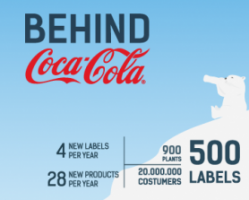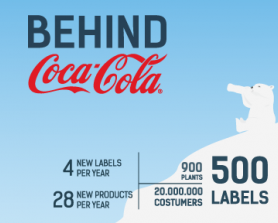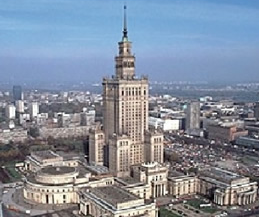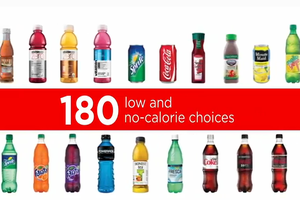Coke polar bear kidnapped by students; firm fights prodigious water ‘waste’ claim

‘Behind Coca-Cola: The Hidden Face of Your Favorite Drink’ is an infographic, with 2900 views as of today, developed by design students at Belgium’s École Supérieure d’Infographie.
This ‘datavisualisation’ abducts Coke’s polar bear icon (this dates back to 1922) and sits it atop an iceberg, to illustrate (it alleges) the visible and ‘hidden’ faces of Coca-Cola, in terms of its planetary and human impact; a general reference is also made to glaciers losing 1m liters of water per second.
Aside from suggesting that the Coca-Cola logo is better known than the Christian cross, other claims include (1) that drinking two cans of Coke per day is as dangerous as smoking two packets of cigarettes (2) That the company wastes 176bn liters of water per year.
(3) ‘Coke may increase your risk to be obese by 60%,’ student authors (Florian Bies, Eric Deloyer, Célia Samyn and Evelyne Dubois) also assert, claiming to use data derived from sources including Wikipedia, Express.Be, Notre-Planete.info and Planetoscope.com.
Coke sets water record straight
But responding to claims 1 and 2, a Coca-Cola Great Britain spokeswoman told BeverageDaily.com that Coke’s 3500+ products served as a hydration source for people 1.8bn times per day, and that the firm worked to “responsibly steward” water wherever it operates.
“We are continually improving our water use efficiency in our plants, are committed to safely returning the water we use to produce our beverages back to communities,” she said.
In 2011, the spokeswoman said, the company used 293.3bn liters of water to make 135bn liters of product, but returned 159bn liters of water back to communities via wastewater treatment.
Another 53.3bn liters went back via community water replenishment schemes, she added.
Coke engaged with experts, partners and governments (locally and globally) to ensure it responsibly managed water use and addressed world water issues, the spokeswoman explained.
“We are aggressively working to meet our goal to return all of the water we use in our beverages and their production by 2020,” she added.
‘All calories count’ in obesity struggle
Turning to the obesity issue in general terms, Coke’s spokeswoman described it as an, “incredibly complex, multifactorial and serious global health problem that requires the collective efforts of everyone across all sectors, including the Coca-Cola Company”.
While Coke partnered with academia, governments, health concerns and civil society to develop solutions, she cautioned that “no single food or beverage alone is solely or primarily responsible for the obesity crisis”.
“All calories count, whatever food or beverage they come from, including those from our caloric beverages,” the spokeswoman said.
“All our products can be part of an active, healthy lifestyle that includes a sensible, balanced diet, proper hydration and regular physical activity," she told BeverageDaily.com.







